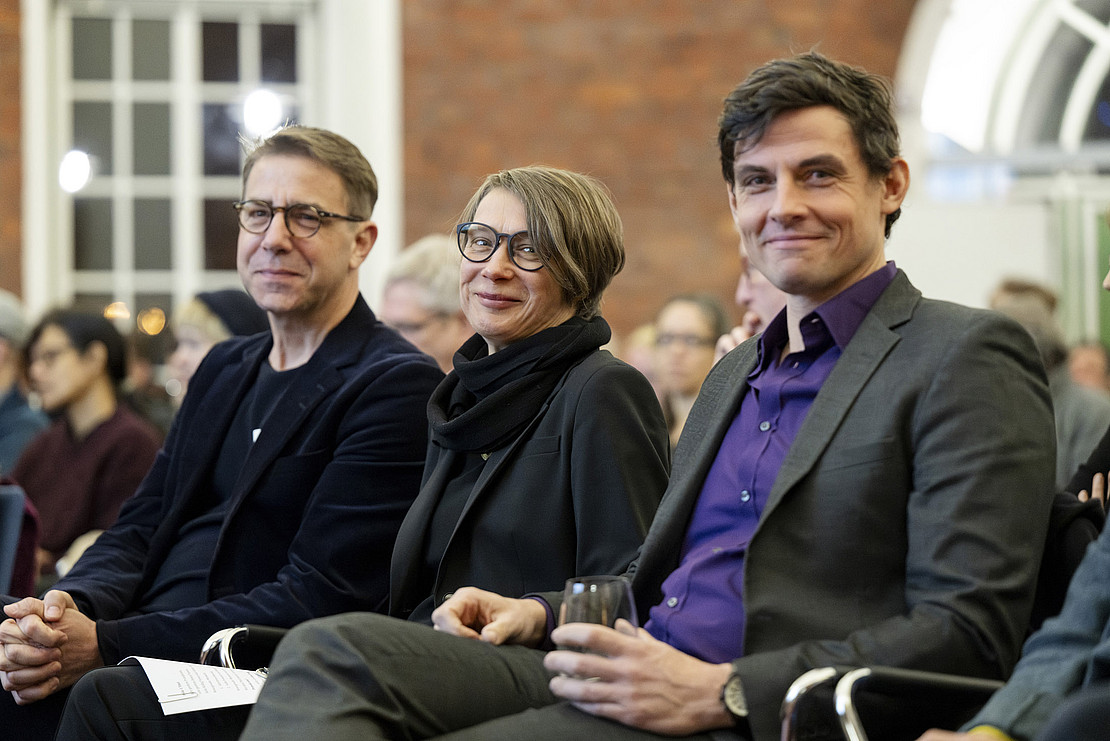This page contains automatically translated content.
Triple inaugural lecture and workshop at the Kassel Institute
 Image: Andreas Berthel
Image: Andreas BerthelIn the spirit of the interdisciplinary search for solutions to the effects of the climate crisis, the rise of right-wing movements and fundamental resistance to change towards a more responsible future, around 80 participants (German/English/Spanish-speaking) came together in Kassel.
In his welcoming address to the workshop, Andreas Fischer-Lescano pointed out that the concept of transformation, like the concept of sustainability, had become susceptible to misuse. This is because transformation and sustainability are often misused for reactionary interests. We must remember the original meaning of the word "sustainability", namely the Latin sustinere in the sense of upholding, enduring, resisting exploitative conditions. In this sense, the event also represents a counter-movement that aims to consciously counter the resistance to socio-ecological transformation.
In terms of content, the event was also characterized by intellectual debates on ecological, economic and social challenges. Representatives from a wide range of disciplines and backgrounds had the opportunity to present their research findings and ideas and to network.
The themed sessions were divided into six clusters, which grouped the content of sustainability research into medium-sized packages. The speakers discussed, for example, current raw material conflicts, such as those brought to light by the mining of lithium or phosphate rock, but also human-environment relationships and thus the situation of those who are usually the first to be affected locally and socially by transformation conflicts. The supposed contradiction of such situations emerged particularly clearly: while protests against new ecological regulations are often perceived as unconvincingly unreflected, they often also reflect the hardships of those directly affected.
The coexistence of progressive and obstructive elements is inherent in most sustainability efforts, as they strive towards a goal far removed from the present. Although the transformation should be quick and consistent, it must not be anti-democratic, anti-social or anti-pluralistic. Accordingly, many attempts are needed in many fields of research, whose commonalities and tasks the workshop sought to capture.
The tightrope act between the present and the objective also became clear in the legal papers. These dealt with the resistance within transnational supply chains and their regulation, while also analyzing the dogmatics and possibilities of transformative legislation. At the other end of the spectrum, researchers in the field of modern technologies presented their more practical case studies: they discussed the potential of artificial intelligence within sustainability reporting, presented a repairable smartphone with a significantly lower ecological footprint and studies on activated carbon from biowaste in the context of urban water management.
The areas of education and strategies in particular have a mediating function. Researchers from the fields of education and schools presented sustainability concepts for teaching and professionalization as a bridge between the present and the target vision, addressing current issues of service learning, gender-competent education and general interdisciplinarity. In addition, the strategy contributions dealt in detail with the advantages of a vulnerability concept or overcoming capitalism, e.g. with the help of a degrowth approach for a new concept of work or the implementation of Agenda 2030 at local level. The Sustainable Development Goals (SDGs), which the Kassel Institute is also committed to implementing and critically reflecting on, were also examined for contradictions and critically examined.
The lively exchange on the process of socio-ecological transformation once again highlighted the need for a common basis. According to Kristina Dietz and Andreas Fischer-Lescano towards the end of the workshop, it is essential to define the concepts both semantically and normatively and to understand the arduous realization of these ideals as an advantageous and disadvantageous process in the making.
The event concluded on Saturday afternoon with a fishbowl discussion with joint reflections, ideas and suggestions for improvement for further meetings. In particular, the translation work between the respective disciplinary languages was emphasized and social issues should be given even more attention in the future. At the same time, joint work tasks called for new meetings, such as the appropriate handling of reactionary resistance and the satisfactory communication of discussed content to a wider audience.
On Friday, representatives of various groups from the climate justice movement also discussed "Ways out of the socio-ecological catastrophe" at UNI:Lokal (SDG+ Lab) at the University of Kassel. The panel discussion was moderated by Prof. Kristina Dietz. With over 160 visitors, the event was a complete success.